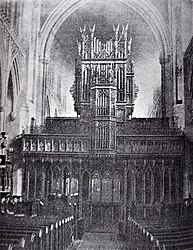Oliver Carter (priest)
Herle, the warden of the college, complaining of the bitter antagonism of the Roman Catholic population of the district, described in a letter to Lord Burghley, dated in April 1574, how "our preacher, who is a bachelor of divinity", was riding out on 14 March to one of the neighbouring chapels, when he was assaulted and wounded.
Carter seems at first to have connived with Herle in making unfavourable grants of the college lands upon long leases and small rents, though soon after he resisted the spoliation.
Funds were not always available for the payment of the stipends of the members of the foundation; and it is suggestive to find, with respect to Carter, that it was about this time that he was assisted out of the money provided by the bounty of Robert Nowell.
The executors of that benevolent man, one of them his brother, Alexander Nowell, the famous dean of St Paul's, lent "to one Mr. Carter, a preacher at Manchester", 40s., "to be repayed again the 20th March Ao 1575", i.e. 1575–6.
His great charges in this "most necessary suit" are alluded to by Dean Nowell (28 October 1576), who, with Carter, was named fellow of the collegiate body by the new charter of 1578.
The reply came out in 1579, and was entitled An Answeare made by Oliver Carter, Bachelor of Divinitie, vnto Certaine Popishe Questions and Demawndes (London, 8vo).
Carter dedicated his Answer to his very good lord, Henry, Earl of Derby, at whose houses in Lancashire in subsequent years he, with other prominent ministers, was a frequent guest or preacher.
The bishop on 1 September 1585 nominated "Mr. Carter, B.D., and preacher of Manchester", one of the moderators of the monthly assemblies, called "Prophesyings", to meet in each deanery.
On Sunday, 25 September that year Dee alludes to Carter's "impudent and evident disobedience" in the church (not "dissoluteness", as printed in the Camden Society's edition of the Diary).
Canon Raines says that it is "clear that Carter was a man of extensive reading, and wrote ably and strongly, though upon the whole temperately, against his subtle and harassing theological opponents.
He thoroughly understood the points of difference between himself and them, and was not disposed to lessen their importance; but there is no evidence that he was a vain man, or that he boasted of his attainments, although he had to thank Cambridge and his own industry for possessing no mean store of learning".
John, baptised at Manchester on 26 February 1580–1, became in 1606 vicar-choral of Christ Church, Dublin, and in the following year prebendary of St. Michan's in the same cathedral; but of the latter he was deprived by Archbishop Jones in 1613,[2] when all record of him is lost.

